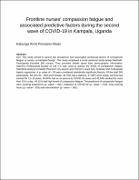Frontline nurses' compassion fatigue and associated predictive factors during the second wave of COVID-19 in Kampala, Uganda
Abstract
Aim: This study aimed to assess the prevalence and associated contextual factors of compassion fatigue in nurses in Kampala.Design: This study employed a cross-sectional study design.Methods: Participants included 395 nurses. They provided details about their demo-graphic information. Stamm's Professional Quality of Life V-5 was used to assess the levels of compassion fatigue. Statistical analysis included Pearson's chi-square and Fischer's exact test, bivariate and multivariate logistic regression. A p- value of <.05 was considered statistically significant.Results: Of the total 395 participants, 58.23% (N= 230) were female, 39.76% had a diploma, 47.09% were single, 43.54% had worked for 11–15 years, 54.94% had an ex-posure to COVID-19 cases and 43.54% worked for more than 10 hr a day. 49.11% had high levels of compassion fatigue. The predictors of compassion fatigue were working experience (p- value=<.001), exposure to COVID-19 (p- value=<.019), long working hours (p- value= .003) and remuneration (p- value=<.001).
URI
https://login.research4life.org/tacsgr1doi_org/10.2147/NDT.S340771https://hdl.handle.net/123456789/405
Collections
- Research Articles [54]

